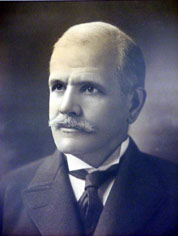Holmes Conrad facts for kids
Quick facts for kids
Holmes Conrad
|
|
|---|---|

Holmes Conrad portrait
|
|
| Born | |
Holmes Conrad (born January 31, 1840 – died September 4, 1915) was an important American figure. He was a politician, a lawyer, and a military officer. He played a big role in law and government during his time.
Contents
Early Life and Military Service
Holmes Conrad was born in Winchester, Virginia. His father, Robert Young Conrad, was a well-known lawyer. His mother was Elizabeth Whiting.
Holmes went to the Virginia Military Institute. After that, in 1858, he studied at the University of Virginia.
When the American Civil War began, Holmes Conrad joined the army. He started as a private in the 1st Virginia Cavalry. He fought throughout the entire war.
He became a lieutenant in August 1862. Later, in 1864, he was promoted to Major. He served as an assistant inspector general for Thomas Rosser’s cavalry division until the war ended.
A Career in Law and Politics
After the Civil War ended in 1865, Conrad began studying law. He worked in his father's law office in Winchester. In January 1866, he passed the Virginia bar exam. This meant he could practice law.
He then joined his father's law practice. In 1878, he was elected to the Virginia legislature. He served there until 1882. Over the next few years, he became a top lawyer in Virginia.
He also became very influential in the Democratic Party. In 1890, Conrad was a founding member of The Virginia Bar Association.
Serving the U.S. Government
In 1893, President Grover Cleveland chose him for a big job. Conrad became the United States Assistant Attorney General. This is a high-ranking lawyer for the U.S. government.
Then, in 1895, he was promoted again. He became the United States Solicitor General. This role involves arguing cases for the U.S. government in the Supreme Court.
After leaving this position in 1897, President William McKinley still wanted his help. Conrad worked for the government on important legal cases. In October 1901, he started teaching law. He lectured on English law history at Georgetown University.
In 1904, he was again asked to help the government. He worked as a special prosecutor on the Postal Fraud Cases. For the last 20 years of his life, he often argued cases. These were before the Supreme Court of the United States. His skills were highly valued there.
Key Legal Achievements
Conrad's most famous case was near the end of his life. It was called Commonwealth of Virginia v. State of West Virginia. This case was about how much money West Virginia should pay Virginia. It was related to public debt from before West Virginia became a separate state.
Conrad represented Virginia in this complex case. His arguments in the Supreme Court were considered outstanding. The court eventually ruled that West Virginia owed Virginia a large sum of money.
Personal Life and Legacy
Holmes Conrad was a tall man with a military posture. Even though he had political influence, he didn't seek public office often. He was a bit reserved and not always a "good mixer."
However, he had a memorable moment at a friend's wedding. When his comrade, Major Foxhall Daingerfield, was getting married, Conrad made a funny comment. When the Major said, "I do thee with all my worldly good endow," Conrad joked, "There goes DiVernon!" DiVernon was the Major's warhorse.
As a lawyer, he was excellent at discussing constitutional questions. He was best at arguing cases in appellate courts, especially the Supreme Court. He did not enjoy everyday office work.
Holmes Conrad was married twice during his life. He had seven children. He passed away in 1915. He was buried in Mt. Hebron Cemetery in Winchester, Virginia.

